Inebriation and Intoxicants
Rent-a-Drunk
For only $3 a night, Colin White would rent out one of the drunks from his pub to liven up a party.So his employees could legitimately claim to be professional drunks.
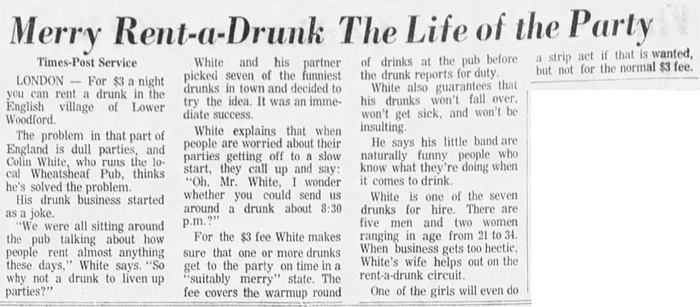
Asbury Park Press - Nov 26, 1971
Posted By: Alex - Wed Jan 11, 2023 -
Comments (3)
Category: Business, Inebriation and Intoxicants, Jobs and Occupations, 1970s
Thanksgiving Hair Tonic Cocktail
In 1909, Friedrich Wilhelm Emil Müller of Chicago received a patent for a hair tonic that, so he claimed, would cause hair "to grow on bald spots of the head." All you had to do was thoroughly rub it into the scalp with the tips of the fingers several times a day.The tonic struck some at the patent office as sounding quite tasty. So it was served as an aperitif at the 1936 Thanksgiving-week banquet in Washington DC celebrating 100 years of the American patent system.
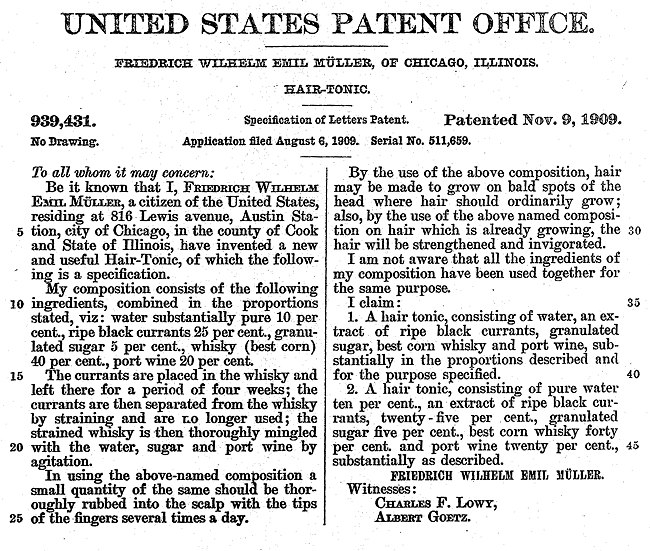
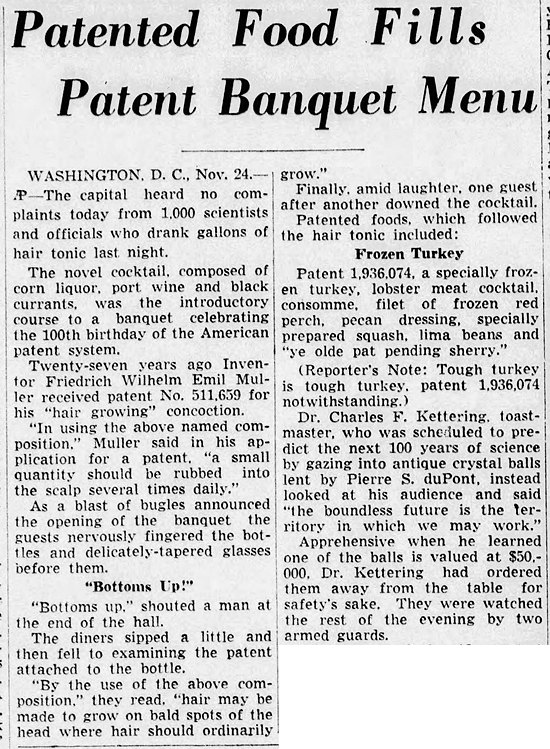
Tacoma News Tribune - Nov 24, 1936
Posted By: Alex - Thu Nov 24, 2022 -
Comments (2)
Category: Inebriation and Intoxicants, Patents, Thanksgiving, Hair and Hairstyling, Alcohol
Atomic Brandy
1971: Soviet scientists claimed to have invented a method of making brandy in 10-15 days, as opposed to the 2-3 years it usually takes. Specifically, their method involved infusing grape juice with "oak shavings irradiated with 200 rads," and in this way rapidly transforming the juice into brandy.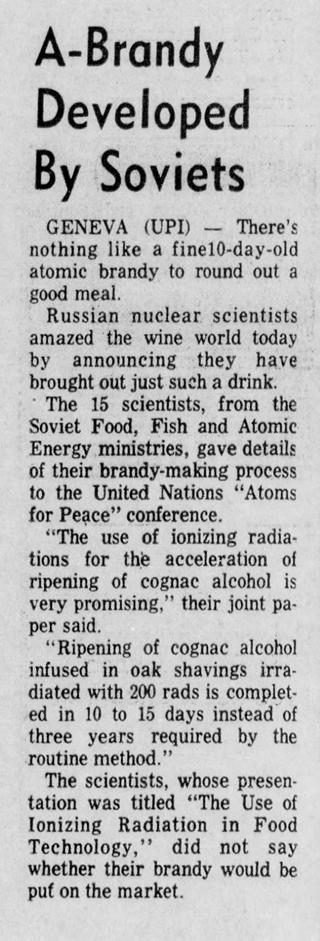
San Rafael Daily Independent Journal - Sep 14, 1971
Some googling reveals that food scientists have continued to experiment with using ionizing radiation to speed up the aging process for alcoholic beverages. For instance, here's a 1999 article about Brazilian scientists using radiation to speed up the aging of cachaca.
Would the resulting brandy or cachaca be radioactive? Apparently no more so than any alcoholic drink.
Consider this Snopes article: Does U.S. Law Require Alcohol to Be Radioactive?
The answer is that, no, the law doesn't require alcohol to be radioactive, but any alcohol made from plants is going to be slightly radioactive because the plants have been exposed to cosmic rays. As opposed to synthetic alcohol made from petroleum, which will be far less radioactive. So, one way to determine if alcohol came from plants or petroleum is to measure how radioactive it is. Most people, I assume, would prefer the more radioactive stuff.
Posted By: Alex - Mon Jul 11, 2022 -
Comments (0)
Category: Inebriation and Intoxicants, Atomic Power and Other Nuclear Matters
Vinous Rubber Grapes
Vinous Rubber Grapes, patented in 1885, were rubber grapes filled with various types of alcohol (wine, brandy, whisky, etc.). The idea was that they would allow people to drink discreetly even in places where alcohol wasn't served. Or, as the advertising copy put it, the rubber grapes provided "a ready means for a refreshing stimulant whenever needed, without reservation, even in the most criticising surroundings."Apparently they sold quite well, right up until the passage of the 18th amendent in 1920.
I don't think that anything quite like them can be bought nowadays.
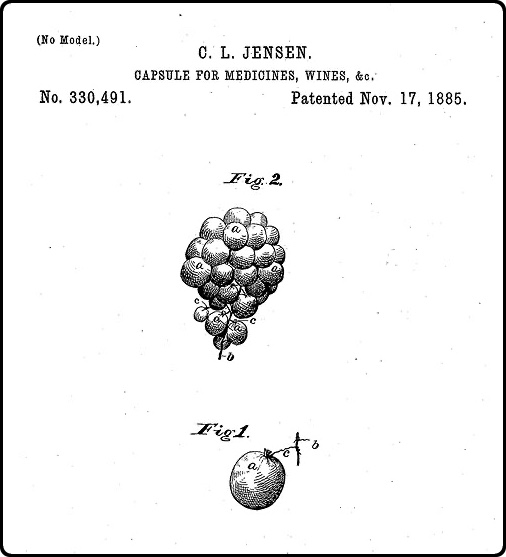
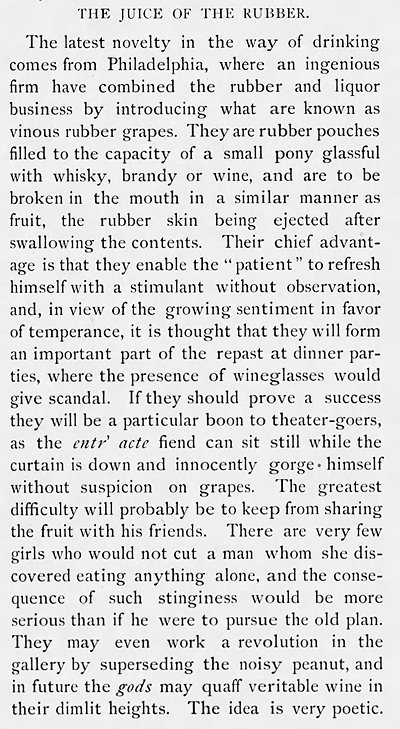
The Topeka Lantern - Feb 19, 1887
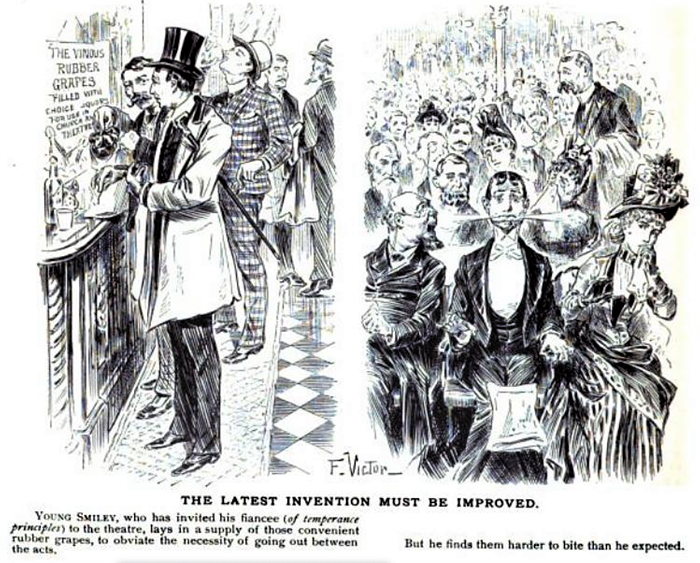
The Judge's Library - Apr 1889
Posted By: Alex - Wed Jun 01, 2022 -
Comments (2)
Category: Inebriation and Intoxicants, Patents, Nineteenth Century
A legendary moment in live theater
During a Dublin production of Gilbert and Sullivan's H.M.S. Pinafore, sometime in early 1986 (or maybe late 1985?), the actor Alan Devlin, who was playing Sir Joseph Porter, abruptly stopped in the middle of his performance, proclaimed, "F... this for a game of soldiers," left the theater, and headed to the pub next door to have a drink, with his microphone still on.Surprisingly, he wasn't fired and was even re-hired for the London production a few months later.
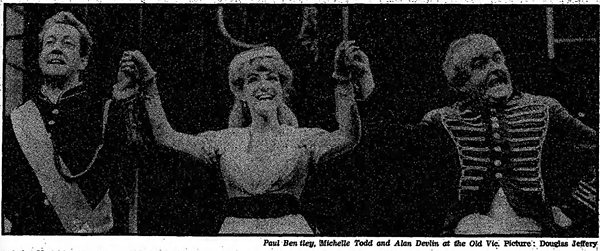
Alan Devlin (right) during the London production of H.M.S. Pinafore
Noel Person, who was the theatrical producer of the play, later described the incident to an Australian journalist (The Melbourne Age - Aug 22, 1986):
"The guy that was playing Dick Deadeye and the girl who was playing Buttercup, well, they freaked. But they were very experienced actors. So they cut to the end of the first half. The understudy was already in the show so they began the second half with him."
Happily, Noel Pearson hired back Mr. Devlin for the show's London season. "I got him to sign a contract in blood: he had to be in the theatre an hour before or he got paid only half his salary until the end of the run; we gave him a minder... When we opened at the Old Vic we had publicity like you never saw. On the opening night, when he appeared on stage, he practically got a standing ovation."
On Twitter, someone who was in the audience that night has posted their memory of what happened. An excerpt below:
Then he tried to leave the coracle. Surmounting he brim of it - about two feet high if my imperfect memory serves - gave him great difficulty. But after a couple of attempts he managed it, and stood center stage, swaying slightly as though in a moderate breeze.
After briefly considering his options, he then announced "ah f*** this for a game of soldiers," hopped down into the orchestra pit (with more adroitness than you'd have expected from his swaying), strode along the central aisle through the audience, and left by the main exit.
Posted By: Alex - Sun Feb 06, 2022 -
Comments (1)
Category: Inebriation and Intoxicants, Theater and Stage, 1980s
Wine Bottle Dust
A gag gift sold to wine lovers back in 1979.Given how many wineries, with attached gift shops, have sprung up in the past twenty years, I think this would sell even better today. An opportunity awaits for an entrepreneur.
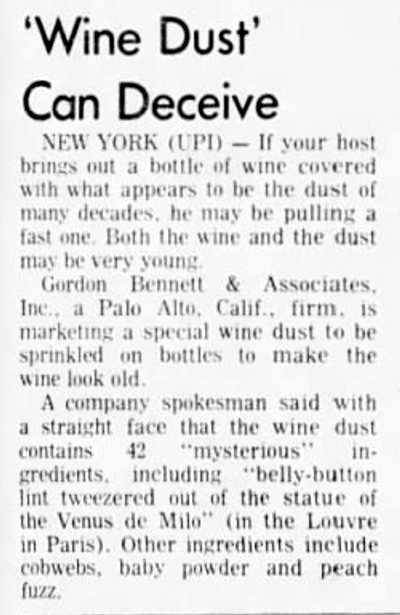
Alexandria Town Talk - Apr 19, 1979
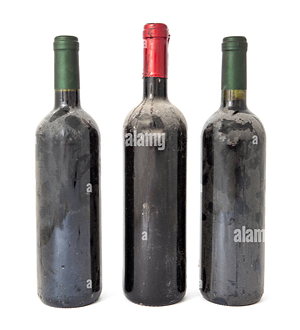
Posted By: Alex - Mon Jan 31, 2022 -
Comments (3)
Category: Imitations, Forgeries, Rip-offs and Faux, Inebriation and Intoxicants, 1970s
Muir’s Improved Pub
In 1865, temperance advocate William Muir obtained a British patent (No. 1 for 1865) for what he called "Improvements in the construction of public houses." Although whether they were actually improvements depended, I suppose, on one's point of view.Muir wanted to improve pubs first by constructing their front walls out of plate glass in order to make the interior visible to people passing by. This, he believed, would "to a great extent check drunkenness and the indecent behaviour of the persons obtaining refreshment."
Second, he wanted to make the entrances only two feet wide in order "to prevent, as far as possible, the entrance of females with extensive steel crinolines." Why prevent women wearing crinolines? He didn't elaborate. Was this some kind of code for keeping prostitutes out of the pubs?
I don't think many publicans rushed to adopt his improvements.
More info about William Muir
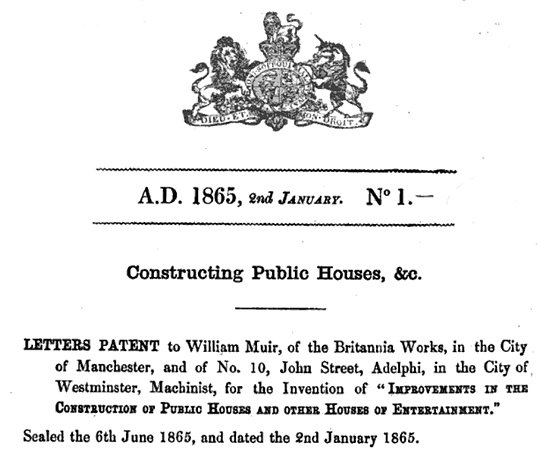
Posted By: Alex - Fri Jan 21, 2022 -
Comments (4)
Category: Inebriation and Intoxicants, Patents, Nineteenth Century
USB Wine
Since this is French, it probably won't work in the U.S.More info: usbwine.com
Posted By: Alex - Fri Jan 07, 2022 -
Comments (5)
Category: Humor, Inebriation and Intoxicants, Internet
Insect Sour
A new alcoholic beverage, "Insect Sour," on sale in Japan boasts that its main ingredient is "giant water bug extract". These water bugs are apparently popular among bug aficionados because they have "a sweet, almost fruity, flavor comparable to some types of shellfish like shrimp."I bet it pairs well with Insect Balls.
More info: Sora News 24
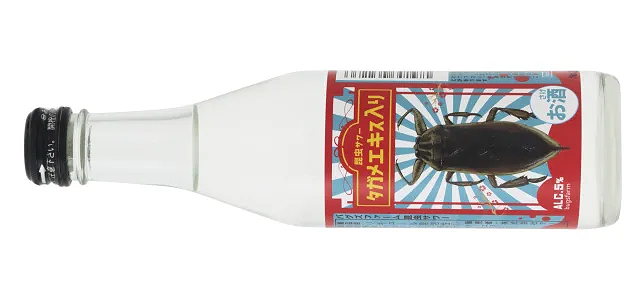
Posted By: Alex - Wed Jan 05, 2022 -
Comments (1)
Category: Inebriation and Intoxicants, Insects and Spiders
Kmarto Wine
In the mid-1980s, K-Mart stores in Gainesville, Florida introduced a K-Mart-branded wine, which they called Kmarto. It cost a mere $1.97, and was available in both a red and white variety.Very little information remains about Kmarto. For instance, I don't know how long it was sold. Just a few years, I think. As far as I know, it was never sold outside of Gainesville.
I was only able to find one picture of a bottle of the stuff — on, of all places, The Horse Doctor (a veterinarian's blog):
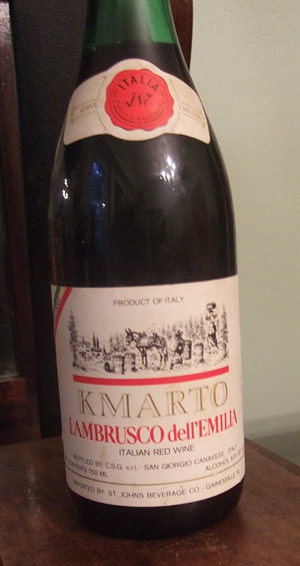
If you happen to still own a bottle of this stuff, I'm sure you could easily sell it for a couple of hundred dollars, because it's definitely a collector's item. As Paul Kirchner has reported in his book Oops!:
Posted By: Alex - Tue Sep 28, 2021 -
Comments (4)
Category: Inebriation and Intoxicants, Alcohol

| Who We Are |
|---|
| Alex Boese Alex is the creator and curator of the Museum of Hoaxes. He's also the author of various weird, non-fiction, science-themed books such as Elephants on Acid and Psychedelic Apes. Paul Di Filippo Paul has been paid to put weird ideas into fictional form for over thirty years, in his career as a noted science fiction writer. He has recently begun blogging on many curious topics with three fellow writers at The Inferior 4+1. Contact Us |




